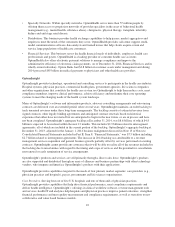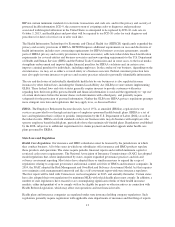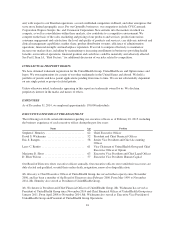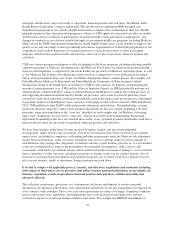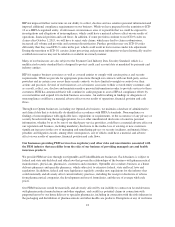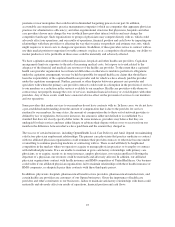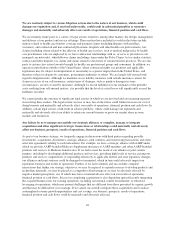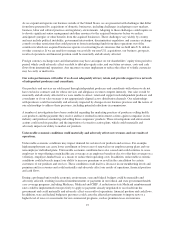United Healthcare 2014 Annual Report Download - page 22
Download and view the complete annual report
Please find page 22 of the 2014 United Healthcare annual report below. You can navigate through the pages in the report by either clicking on the pages listed below, or by using the keyword search tool below to find specific information within the annual report.environments and associated requirements and uncertainties regarding tax, licensing, tariffs, intellectual property,
privacy, data protection, investment, capital (including minimum solvency margin and reserve requirements),
management control, labor relations, fraud and corruption present compliance requirements and uncertainties for
us that are different from those faced by U.S.-based businesses. We have acquired and may in the future acquire
or commence additional businesses based outside of the United States, which may subject us to foreign and U.S.-
based laws specific to the products and services we acquire or develop outside of the United States. For example,
our Amil business subjects us to Brazilian laws and regulations affecting the managed care and insurance
industries, which vary from comparable U.S. laws and regulations, and to regulation by Brazilian regulators,
whose approach to the interpretation, implementation and enforcement of industry regulations could differ from
the approach taken by U.S. regulators. In addition, our non-U.S. businesses and operations are also subject to
U.S. laws that regulate the conduct and activities of U.S.-based businesses operating abroad, such as the FCPA.
Our failure to comply with U.S. or non-U.S. laws and regulations governing our conduct outside the United
States or to establish constructive relations with non-U.S. regulators could adversely affect our ability to market
our products and services, or to do so at targeted operating margins, which may have a material adverse effect on
our business, financial condition and results of operations.
The health care industry is also regularly subject to negative publicity, including as a result of governmental
investigations, adverse media coverage and political debate surrounding industry regulation, such as Health
Reform Legislation and associated exchanges. Negative publicity may adversely affect our stock price and
damage our reputation in various markets.
Health Reform Legislation could materially and adversely affect the manner in which we conduct business
and our results of operations, financial position and cash flows.
Due to its complexity, ongoing implementation and continued legal challenges, Health Reform Legislation’s full
impact remains difficult to predict and could adversely affect us. For example, Health Reform Legislation
includes specific reforms for the individual and small group marketplace, including guaranteed availability of
coverage, adjusted community rating requirements (which include elimination of health status and gender rating
factors), essential health benefit requirements (resulting in benefit changes for many members) and actuarial
value requirements resulting in expanded benefits or reduced member cost sharing (or a combination of both) for
many policyholders. In addition, if we do not maintain certain minimum loss ratios, we are required to rebate
ratable portions of our premiums to our customers. These changes can cause significant disruptions in local
health care markets and adjustments to our business, all of which could materially and adversely affect our
results of operations, financial position and cash flows.
Health Reform Legislation required the establishment of health insurance exchanges for individuals and small
employers and requires insurers participating on the health insurance exchanges to offer a minimum level of
benefits and includes guidelines on setting premium rates and coverage limitations. While risk adjustment applies
to most individual and small group plans in the commercial markets, actual risk adjustment calculations and
transfers could materially differ from our assumptions. Our participation in these exchanges involves
uncertainties associated with mix and volume of business and could adversely affect our results of operations,
financial position and cash flows. In addition, pending legal challenges to the availability of tax subsidies to
participants in federal exchange marketplaces could significantly disrupt the health insurance market and
negatively affect our business.
Our results of operations, financial position and cash flows could be materially and adversely affected if fewer
individuals gain coverage under Health Reform Legislation than we expect, if we are unable to attract these new
individuals to our UnitedHealthcare offerings, or if the demand for Health Reform Legislation related products
and capabilities offered by our Optum businesses is less than anticipated.
20


